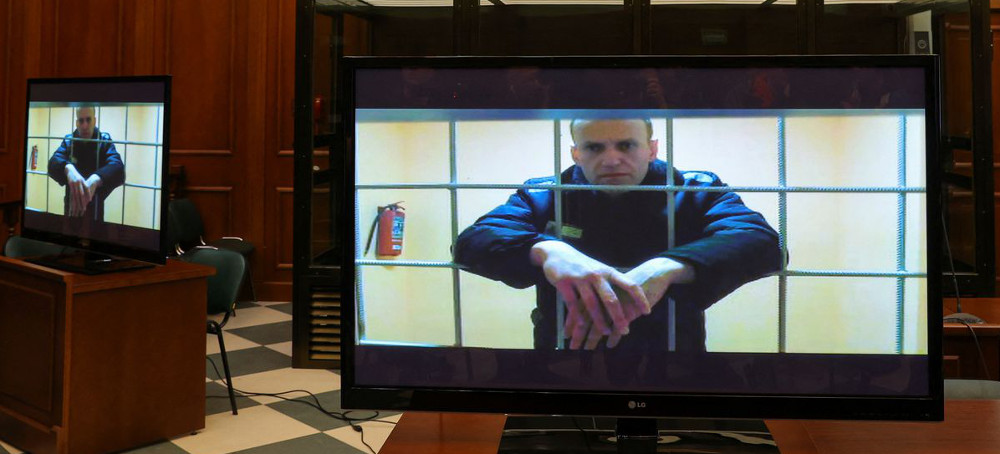The Brave Man Whom Putin Wants to Kill
Nicholas Kristof The New York Times Russian opposition leader Alexei Navalny is seen on screens via a video link from the IK-2 corrective penal colony in Pokrov during a court hearing to consider an appeal against his prison sentence in Moscow, Russia, May 24, 2022. (photo: Evgenia Novozhenina/Reuters)
Russian opposition leader Alexei Navalny is seen on screens via a video link from the IK-2 corrective penal colony in Pokrov during a court hearing to consider an appeal against his prison sentence in Moscow, Russia, May 24, 2022. (photo: Evgenia Novozhenina/Reuters) The Brave Man Whom Putin Wants to Kill
Nicholas Kristof The New York TimesAleksei Navalny, Russia’s leading dissident and opposition leader, may be something of a Mandela of our age. Poisoned, imprisoned, brutalized, Navalny stands unbroken in his cell: still mocking Putin and scathing in his denunciation of the invasion of Ukraine.
He is a Kremlin nightmare. Navalny ran for president until he was blocked, and his exposés about a supposed $1 billion Putin pleasure palace infuriated the Russian leader. Navalny not only survived assassination attempts but also, when sent to the gulag, tried to unionize prisoners and guards — plus he has been nominated for a Nobel Peace Prize and is now the star of a film that is a finalist for an Oscar.
I can’t interview Navalny in prison, so I spoke to his 21-year-old daughter, Dasha Navalnaya (the feminine form of the family name). She’s a junior at Stanford University, and while navigating exams and term papers, she is also campaigning for her dad and promoting a superb documentary about him, “Navalny.” It won the award for best documentary this month at the British Academy Film Awards.
“I sort of perceive the documentary as this ‘get out of death’ card,” she told me in flawless, lightly accented English. “The more awareness that we create, the less Putin and his posse would be tempted to kill my dad.”
Navalny, 46, is a lawyer with a large following in Russia for his withering reports about Russian corruption and about Putin, whom he calls a “madman.” Attackers presumably linked to the Russian government twice hurled chemical dye on him, damaging his vision in his right eye, and in 2020 he collapsed on a plane. He almost died but was evacuated to Germany, where scientists determined he had been poisoned by a Novichok nerve agent, used by Russia’s government for high-priority assassination targets.
The documentary follows Navalny’s recovery and the detective work to track down the Russian officials who apparently poisoned him. The film presents the extraordinary scene in which Navalny telephoned one of his would-be assassins and, pretending to be another Russian official, got him to explain how the poisoning was carried out.
By now it seemed clear that Putin wanted Navalny dead. But in early 2021, Navalny flew back to Moscow. For Dasha, who had worried since she was 12 about her dad being assassinated, and who had learned of his poisoning from Twitter, that wasn’t necessarily her first choice.
“My personal preference would have been that he stayed with me,” Dasha told me. “But I never questioned his decision to go back.”
“I’m super worried about him always, as a daughter,” she said. “I have it in the back of my head that maybe he shouldn’t be doing this. But it’s what he’s passionate about, and for the greater good of the country.”
When Navalny returned, the government promptly arrested him. The family is now allowed to communicate with him only by exchanging letters.
“He is sort of living vicariously through me, through a college experience in America, which is very fun for him,” she said wistfully.
The authorities have tried to break Navalny in prison. His back has been painful since the poisoning, so they had him sit on a stool that magnified the pain. And now he is in continuous isolation.
Some critics have argued that Navalny is a xenophobic nationalist unworthy of admiration. I looked into the accusations, and here’s what I found. In 2007, Navalny made two over-the-top, dumb and offensive video clips, each a minute or less, that could be seen as vilifying immigrants, and for several years after that he participated in a nationalist march. Then he seemed to move on, and in 2014 he denounced Russia’s invasion of Crimea.
People are complicated, but Navalny today seems so committed to democratic and European values that he is risking his life for them.
The government moved Navalny last month to continuous confinement in an isolation cell, and he faces additional charges that could leave him in prison for 35 years. At Stanford, Dasha tries not to think too much about the danger her father faces.
Navalny still has managed to get material out to his team for his social media accounts — I’m not going to say how, in case Putin is reading this — and he is as untamed as ever. To mark the anniversary of Russia’s all-out invasion of Ukraine, Navalny published a trenchant critique of Putin’s “unjust war of aggression against Ukraine” and argued that “Russia is suffering a military defeat.”
Somehow through all this, he maintains his sense of humor.
“I laugh at least thrice a day, even when I’m all alone in the cell,” he tweeted recently in a riff about the awful music and food in the prison. “I’m the merriest person at a funeral.”
